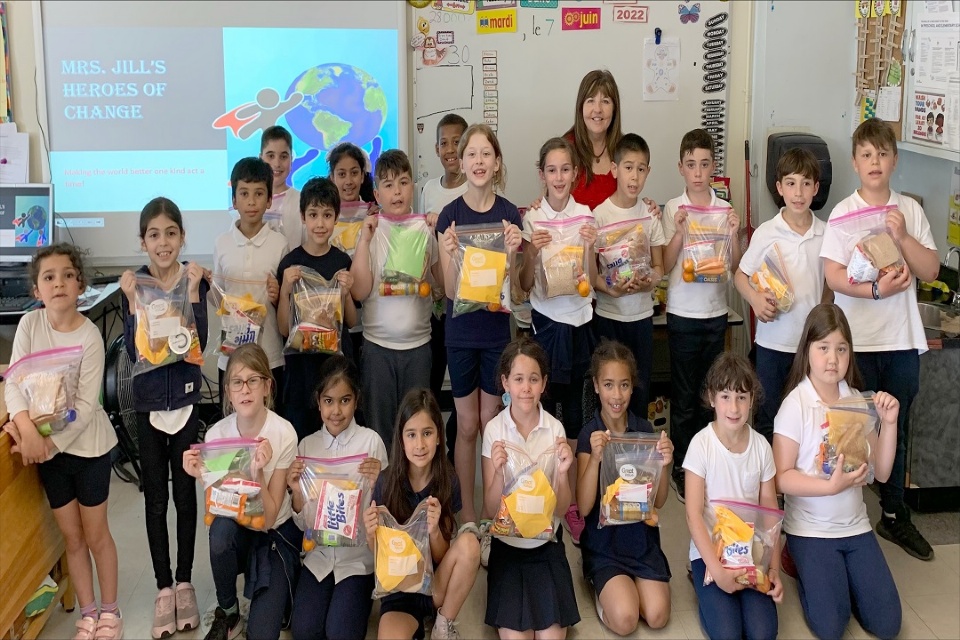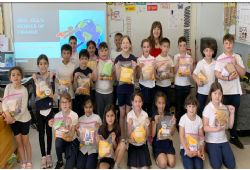In Jill Davey’s grade 2 classroom, core curriculum takes the shape of real-world applications. Math, science, writing, citizenship, and critical thinking all come into play in a meaningful way. Last year’s second graders became the first cohort of Heroes of Change, making lunches for food-compromised or homeless individuals in the greater Montreal region.
Every second Tuesday of the month, Davey’s students transformed their classroom at Souvenir Elementary School into a makeshift kitchen, preparing 25 nutritious lunches complete with a sandwich, beverage, fruit, vegetable, snack and an encouraging note for the recipient. Over the course of the school year, 175 lunches were prepared with care by the students, then delivered by Davey to a local organization who distributes the fresh lunches to those in need.At first, Davey purchased the food supplies with her own money, but as soon as parents got wind of the initiative, food and monetary donations began pouring in. As the project gained success, the school was able to provide funding via a school grant designed for school initiatives like this.Not only did students learn about global, national and local issues such as poverty and homelessness, they learned key skills such as critical thinking. “Each month, we would take the time to decide what the menus would be for the lunches, and students needed to make decisions about what would be the best choice in terms of nutrition, budget or even cultural food preferences,” explains Davey.If students chose to include orange juice as the beverage, they learned the benefits and nutritional value of that choice versus another beverage. Students discussed the choices for the lunch they packed after learning about food labels, sugar content, nutritional value, vitamin content, etc. “It was amazing to see them become more culturally aware, compassionate and empathetic towards complete strangers,” she says. Even on a practical level, students learned how to prepare simple sandwiches and snacks, how to slice vegetables safely and how to package the items properly.Above and beyond the practical knowledge students gained through the Heroes of Change project, they also gained perspective. Several students surveyed by Davey discovered that not everyone has access to food and shelter as easily as they do. Others discovered the joy of helping those less fortunate. “Giving me the chance to prepare food for the people in need and knowing that they are not hungry makes me happy,” says Leo.Alessia, another of Davey’s students, feels similarly. “We get to help people who are in need. It makes me feel happy to know I can make someone feel loved,” she says. Davey believes that projects like this—when students are given an opportunity to be directly involved—allow students to learn important like skills in a concrete way.Even better if those skills transfer outside of the classroom, as they have for Katie: “Whenever I see a homeless person, if they are nearby a store, I beg my dad to let me pick something out for them,” says the second grader.When it comes down to it, perhaps classmate Elias put it as succinctly as possible: “We are changing people’s lives.”
 In The Latest Issue:Latest Issue:
In The Latest Issue:Latest Issue:
- A Bittersweet Farewell
- The new Laval Aquatic Co...
- The End of an Era:
Articles
Calendar
Virtual- ANNUAL TEACHER APPRECIATION CONTEST
- APPUI LAVAL
- ARTS & CULTURE
- CAMPS
- CAR GUIDE
- CCIL
- CENTENNIAL ACADEMY
- CHARITY FUNDRAISING
- CITYTV
- COSMODÔME
- COMMUNITY CONNECTIONS
- COVER STORY
- DINA DIMITRATOS
- ÉCOLE SUPÉRIEURE DE BALLET DU QUÉBEC
- EDITORIALS
- ÉDUCALOI
- EDUCATION
- EMPLOYMENT & ENTREPRENEURSHIP
- FÊTE DE LA FAMILLE
- FÊTE DU QUARTIER SAINT-BRUNO
- FAMILIES
- FESTIVAL LAVAL LAUGHS
- FÊTE DE QUARTIER VAL-DES-BRISES
- FINANCES
- GLI CUMBARE
- GROUPE RENO-EXPERT
- HEALTH & WELL-BEING
- 30 MINUTE HIT
- ANXIETY
- CHILDREN`S HEALTH & WELLNESS
- CLOSE AID
- DENTAL WELLNESS
- EXTREME EVOLUTION SPORTS CENTRE
- FONDATION CITÉ DE LA SANTÉ
- GENERAL
- HEARING HEALTH
- MESSAGES FROM THE HEALTH AGENCY OF CANADA
- MENTAL HEALTH
- SEXUALITY
- SOCIAL INTEGRATION
- SPECIAL NEEDS
- TEENS
- THE NUTRITION CORNER
- THE NUTRITION CORNER - RECIPES
- VACATION DESTINATION
- WOMEN'S FITNESS
- WOMEN'S HEALTH
- HILTON MONTREAL/LAVAL
- HOME & GARDEN
- INTERNATIONAL WOMEN'S DAY
- JAGUAR LAVAL
- LAVAL À VÉLO
- LAVAL FAMILIES TV SHOW
- LAVAL FAMILIES MAGAZINE CARES
- LAVAL URBAN IN NATURE
- LE PARCOURS DES HÉROS
- LES PETITS GOURMETS DANS MA COUR
- LEON'S FURNITURE
- LEONARDO DA VINCI CENTRE
- LFM PREMIERES
- LIFE BALANCE
- M.P. PROFILE
- MISS EDGAR'S AND MISS CRAMP'S SCHOOL
- MISSING CHILDREN'S NETWORK
- NETFOLIE
- NORTH STAR ACADEMY LAVAL
- OUTFRONT MEDIA
- PASSION SOCCER
- PARC DE LA RIVIÈRE-DES-MILLE-ÎLES
- PÂTISSERIE ST-MARTIN
- PIZZERIA LÌOLÀ
- PLACE BELL
- PORTRAITS OF YOUR MNA'S
- ROCKET DE LAVAL
- SACRED HEART SCHOOL
- SCOTIA BANK
- SHERATON LAVAL HOTEL
- SOCIÉTÉ ALZHEIMER LAVAL
- STATION 55
- STL
- SUBARU DE LAVAL
- TECHNOLOGY
- TEDXLAVAL
- TODAY`S LAURENTIANS AND LANAUDIÈRE
- TODAY`S LAVAL
- WARNER MUSIC
- THIS ISSUE
- MOST RECENT
Magazine
Articles ~e 105,7 Rythme FM 4 chemins Annual Teacher Appreciation Contest Appui Laval Arts & Culture Ballet Eddy Toussaint Camps THIS ISSUE MORE...
CONTESTS Enter our contests
CONTESTS Enter our contests
CALENDAR
Events & Activities
COMMUNITY Posts Events
PUBLICATIONS Our Magazine Family Resource Directory
LFM BUSINESS NETWORK Learn more
COUPONS Click to save!
COMMUNITY Posts Events
PUBLICATIONS Our Magazine Family Resource Directory
LFM BUSINESS NETWORK Learn more
COUPONS Click to save!
SUBSCRIPTIONS
Subscribe to the magazine
Un-Subscribe
E-NEWSLETTER Subscribe to our E-newsletter Un-Subscribe
WRITE FOR US Guidelines & Submissions
POLLS Vote today!
E-NEWSLETTER Subscribe to our E-newsletter Un-Subscribe
WRITE FOR US Guidelines & Submissions
POLLS Vote today!
ADVERTISERS
How to & Media guide
Pay your LFM invoice
SUGGESTIONS Reader's Survey Suggest a Listing
LFM About Us Our Mission Giving Back Contact Us
SUGGESTIONS Reader's Survey Suggest a Listing
LFM About Us Our Mission Giving Back Contact Us
 PICK-UP LOCATIONS
Get a copy of LFM!
PICK-UP LOCATIONS
Get a copy of LFM!
TERMS & CONDITIONS Privacy | Terms
ISSN (ONLINE) 2291-1677
ISSN (PRINT) 2291-1677
Website by ZENxDESIGN





Tweet
Share